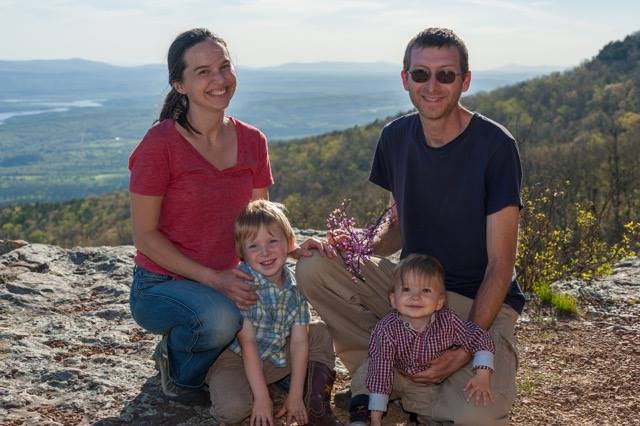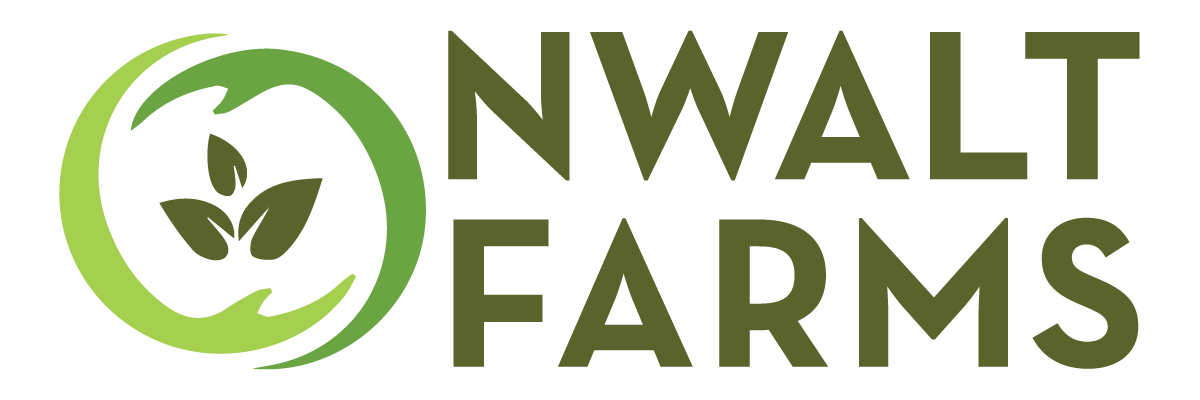It’s a warm and sunny afternoon in Madison County. According to the calendar, it’s fall, but Larry Karigan-Winter, Sally and Allen Hunter and I take shelter from the heat in their mobile home. To the southwest is their three-quarter of an acre vegetable garden in near full sun, and to the north a steep bluff where natural Powder Mill Springs gently fall, or run wild depending on the rain runoff, through a deep ravine that cuts through the property.

Most of us sit at the kitchen table, while Allen prefers to stand leaning against the sink or a nearby chair. The unseasonable temperatures are a point of conversation just as was they were during their first days building the incubator garden at the KW Heritage Farm, a little less than a year ago.
Karigan-Winter recalls having to delay the installation of water lines, an outhouse (which is still acceptable in Arkansas), a grey water system and electric power to prepare for the Hunters’ mobile home during an unusual early cold snap in November 2018. “As the landowner, I took it as my responsibility to install the infrastructure required for their homestead,” said Larry. “Their job was to secure housing and to start their crops.” It was a stressful period to a new chapter both the Hunters and Karigan-Winter had been contemplating for years, and now there was little time to get the Hunter’s new housing secure with winter quickly approaching. The electricity was hooked up the day after Thanksgiving and the underpinning to the home, to secure the water lines, was completed by the second week of December. “It was a push,” noted Larry.
Larry and his wife Marty (or the KW’s as he affectionately refers to his family) purchased 50 acres in 1981 in the center of Madison County. The area is known as Trinkle Country – paying homage to the Trinkle family who moved into what’s called the Jones community in lower Reed’s Creek around 1928. The KW’s would raise three girls here, hold jobs off the farm and eventually acquire an additional 40 acres over the years. Their ambition was fueled by joy and tremendous willpower as they strived to shape the land in sustainable ways. Their goal was to produce as much of their own organic food as they could. The remote location is beautiful but starting with raw land, they had to build an access road, bridges, their home, barns and fencing. They also started to farm growing organic vegetables as well as produce dairy, eggs, pork and beef.
The Hunters quickly exhausted their resources trying to find suitable land to farm, and reached out to the Northwest Arkansas Land Trust. Their names would go on a waiting list for NWA Farm-Link as the nonprofit worked to solidify the website and program concept for launch. Word got around to Larry about the Hunter’s desire to farm on their own and, despite not feeling completely ready to start his incubator farm, he agreed to take them on.
“I would not necessarily recommend other farm owners or farm seekers do what we did, taking a leap faith and figuring things out as we go,” said Larry. “We had the benefit of knowing Sally as a student and the two of them for six years as market farm interns when they returned to the area.” Sally agrees, “I would encourage farm seekers to take the time to build a relationship with any potential farmland owner you might want to work with. Do your research on what the farm has to offer and be sure it meets your goals.” She is very involved in their farm operation today, marketing their vegetables at the Fayetteville Farmers Market two to three days a week, in addition to working at Ozark Natural Foods part-time. She admits Allen does most of the gardening with Sally helping when she can. Their two boys, Gabriel, age seven, and Samuel, age four, have been great helpers with harvesting the vegetables three times a week. Seeing the boys involved gives Sally and Allen great joy and much needed help, as their contributions lessen the workload.
 Together, both families share a common goal — for the Hunter’s to earn enough savings to purchase their own land to farm in three to five years. So far, that plan is on track. In their first year, they have managed to pay down the loan on the mobile home, pay living expenses, put some money aside, buy tools and get new tires for their vehicle.
Together, both families share a common goal — for the Hunter’s to earn enough savings to purchase their own land to farm in three to five years. So far, that plan is on track. In their first year, they have managed to pay down the loan on the mobile home, pay living expenses, put some money aside, buy tools and get new tires for their vehicle.
At the KW Heritage Farm, the farm owners have given the new farmers a 30,000 sq. ft garden with plenty of irrigation from a second spring developed. And, there is no profit sharing, nor rent. What the Hunters make they keep, which creates a great incentive for them to work hard and reap the benefits. “We are working on formalizing a lease agreement based on a Memorandum of Understanding we agreed upon at the start,” says Larry. “We look forward to joining the NWA Farm-Link community and taking advantage of any resources that might be helpful to our shared vision.”
In the meantime, the Hunters are also preparing to purchase next spring’s seeds, continue raising and marketing their fall crops and dream what their future may hold, including a name for their own farm.
It’s a bold venture based on a lot of trust between two hard working families. Both families are anxious to see how this initiative progresses. Once the Hunters have accumulated enough assets to buy their own land, a new family would move to the incubator farm. Larry likes to say, “he’s raising farmers.”




Happy Thanksgiving Marty and Larry. Over the 50 years, when we first met, you two still amaze me.
Larry and Marty are both great people that I have had the privilege to be around on several occasions. They inspire the younger generation and help them reach their farming goals.
This is so great! I’m so proud of this going on in my home town. I’m so proud to know these people.